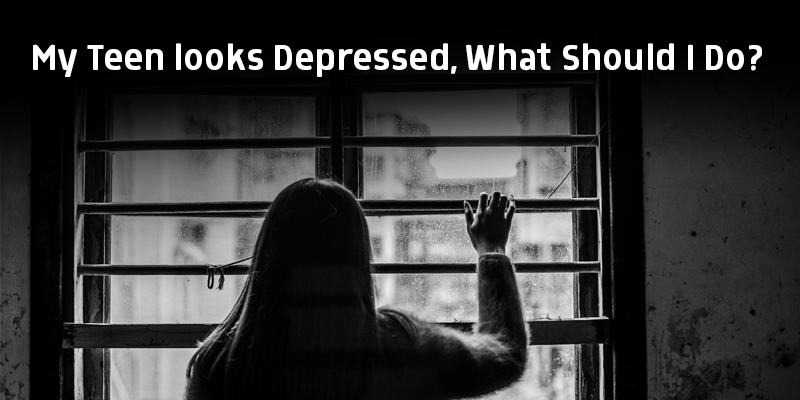
Did you ever think that your unhappy or irritable teenage child might actually be suffering from depression? Although, most teens feel irritable and sad at times because of the physical, hormonal and emotional changes going on in their mind and bodies. Yet research shows that 1 out of every 8 teenagers has depression. But good news is that, teen depression can be managed and treated just like any other health problem. Therefore, if your teen displays symptoms of depression like sadness, irritability or anger for more than 2 weeks, you should seek help from a mental health professional.
Teen depression is a serious psychological problem that causes a persistent feeling of unhappiness and loss of interest in daily activities. It affects how your teenager feels, thinks and behaves. It can cause functional, emotional and physical issues. Although anybody can suffer from depression, symptoms are usually different between teens and adults.
Issues such as parental pressure, academic performance, peer pressure, and changing bodies can bring a lot of ups and downs in a teen’s life. For some teenagers, the lows can be more than just a temporary phase — they are symptoms of depression.
Most important point– Teen depression is not an emotional weakness or something that can be overcome by willpower. It can cause serious consequences and requires long-term management. For most teenage children, symptoms of depression ease with treatment such as medication and counseling.
What are the symptoms of teen depression?
Symptoms may vary in severity, but changes in your teen’s behavior and emotions may include the following:
Emotional changes-
- Frustration or anger, even over small matters
- Sadness, which can include crying spells for no obvious reason
- Irritable or annoyed mood
- Feeling hopeless or worthless
- Loss of interest in family and friends
- Frequent conflicts with family
- Loss of interest in usual activities
- Low self-esteem
- Exaggerated self-blame or self-criticism
- Extreme sensitivity to failure or rejection
- Trouble concentrating, remembering things and making decisions
- Frequent thoughts of dying or suicide
Behavioral changes-
- Insomnia or sleeping too much
- Tiredness and lethargy
- Decreased appetite and weight loss or increased cravings and weight gain
- Agitation or restlessness (inability to stay still)
- Use of alcohol or drugs
- Frequent complaints of body aches or headaches, which may cause frequent visits to the school nurse
- Frequent absence from school and poor school performance
- Social isolation
- Reduced attention to personal hygiene
- Disruptive or risky behavior and anger outbursts
- Self-harm like cutting or excessive piercing or tattooing
- Planning a suicide or attempting it
What are the causes of Teen depression?
The specific cause of teen depression is still not known. However, a variety of factors may be responsible, such as:
Hormones: Changes in hormones may cause or trigger depression.
Brain chemistry: Neurotransmitters are brain chemicals that carry signals to other parts of your brain and body. When these chemicals are impaired or do not function optimally, it affects the nerve transmission leading to depression.
Early childhood issues: Traumatic and disturbing events in childhood, such as emotional or physical abuse, loss of a parent or domestic abuse may cause changes in the brain that can make a child more susceptible to depression.
Inheritance: Depression is more common in children whose blood relatives, such as a parent or grandparent, also have the condition.
When should I consult a doctor for teen depression?
If signs and symptoms of teen depression are worsening and are interfering with your teen’s daily life, talk to your primary physician or a psychologist and share your concerns. Your family doctor or pediatrician can also be a good place to start.
Symptoms of depression do not get better on their own – in fact; they may get worse with time and lead to bigger issues if untreated. Depressed teenagers can be at higher of suicide, even if the symptoms are not very serious.
What are the complications of teen depression?
Depression if left untreated can lead to behavioral, emotional and physical health issues that can greatly impact your teen’s life. Complications of teen depression may include:
- Poor performance at school
- Substance abuse
- Family conflicts
- Suicidal thoughts
- Suicide attempts or suicide
What is the treatment for teen depression?
There are a wide variety of procedures used to treat depression, including medications and psychological therapy. Family therapy may work if the family problem is contributing to teen’s depression. The teen may also need support and help from family members, friends and teachers to help with any school or peer problems. The best option is to consult a psychologist or a psychiatrist for proper evaluation, diagnosis and management of the condition.
Psychotherapy:
Psychotherapy (psychological counseling) or talk therapy is a general term used for treating depression by talking to the patient about depression and related issues with a mental health professional. Different types of psychotherapy can be used, such as interpersonal therapy or cognitive behavioral therapy. Psychotherapy can be done one-on-one, with family members or in a group. Through regular sessions, the patient can:
- Identify the causes of depression
- Learn how to make changes in unhealthy behaviors or thoughts
- Improve relationships and experiences
- Find better ways to cope with situations
- Regain a sense of happiness and contentment
- Help ease symptoms like hopelessness, irritability and anger
If you feel your teenager child is showing some signs of depression like irritability, social isolation, anger, sadness or loss of interest in usual activities, you should not wait for the symptoms to improve on its own. Depression if left untreated can lead to serious consequences. Therefore, book an appointment with a psychologist at RxDx Multispeciality Clinic, who is expert in understanding child psychology, identifying the mental health problems and suggesting the proper course of treatment. They may also refer you to a psychiatrist if required.
For further details, please contact: 080-49261111, 6745-8111
Download RxDx Smart Healthcare App Now!!!



